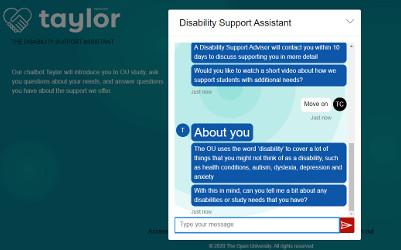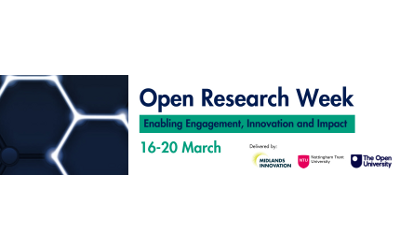OU trials chatbots to support students with disabilities

Chatbots were named in this year’s Innovating Pedagogy report as one of the top 10 practices that will influence education and are already been trialled to support OU students.
This is through the OU’s ADMINS chatbot project, which has been connecting educational experts, staff and students to develop a chatbot assistant that guides students with disabilities to provide information about themselves and to understand the support available.
Engaging with a consultation group of students and staff, experts at the OU’s Institute of Educational Technology (IET) are driving the development of a chatbot assistant to support students who need to disclose disabilities and gain information in relation to their studies.
The ADMINS project, developed in partnership with Microsoft through their AI for Accessibility programme, has created an artificial intelligence chatbot which can act as an alternative to filling in forms and can be interacted with through text or speech.
The Open University team are finding that using the chatbot can improve the experience of providing initial information to student support advisors about an individual’s circumstances and accessibility needs.
Staff-student partnership driving OU’s research
Discussing the importance of student consultation to this research, Dr Tim Coughlan, Project Lead and Senior Lecturer at the OU, shared how students are contributing to the iterative development of the ADMINS chatbot to replace an online form.
Dr Coughlan stated:
“Participation is a really big theme in our research. Creating this [chatbot] at The Open University made sense as we have a big population of disabled students, many of whom are keen to work with us on research and development projects. The goal of [2020] was to develop a virtual assistant that we were happy to use in a trial with 100 students. We wanted to make this realistic so that students actually used the chatbot as part of their registration process.
“We have completed our main trial and had over 130 students participate by testing out the assistant and giving us their feedback and ideas for improvement. The majority of students were very positive about the potential for this to improve the process and help them understand OU study. We’ve also learnt lessons to make this even better in the future.
“The assistant has a lot of the features that we envisioned for it working: students can talk to the chatbot either with type text chat or speaking with voice. One of the key things is how the conversation flows, so the chatbot talks to students, asks students questions and also answer their questions. A big part of the design is creating a natural conversation flow that feels right to the person talking to it."
Using student feedback to improve the product
With students and staff providing input to the design and project direction right from the beginning, and then testing each iteration, Dr Coughlan aims that students will be able to inform the research and development team of areas that the chatbot could be developed to better support, inform and assess prospective student circumstances.
While we initially intended to organise a mix of in-person workshops and online testbeds, the impacts of the COVID-19 pandemic influenced the ADMINS projects to shift feedback to being primarily online. Discussing the feedback which has happened and is planned to happen through the duration of the project, Dr Coughlan explained how the project has shifted to ensure inclusion for iterative development.
“We had a couple of workshop events in which we invited students and staff to come along and draw out what they wanted out of a virtual assistant, discuss the challenges that come with talking to a virtual assistant, and explore how virtual assistants could be included in the university processes to talk through their disabilities”, Dr Coughlan explained.
Dr Coughlan closed, “COVID has not stopped us engaging with students. We have had video calls with our group of student consultants, to do things like review how the chatbot conversation flows. Our testing and trials have been able to go ahead with some modifications. It has not been easy because of COVID, and some of our plans didn’t materialise. But we still managed to have effective participation in these adverse circumstances.”
Further work to build on the ADMINS project will continue in 2021, with significant updates added to the ADMINS Project Page and the IET Learning Futures Research Programme. This includes knowledge exchange acitivities to explore how similar assistants could be used to support students through similar processes in other education institutions.
Visit the ADMINS Project page to stay up to date with developments on the ADMINS assistant. To learn more about how IET can support your institution to use an intuitive chatbot, contact our experts.
Contact our news team
For all out of hours enquiries, please telephone +44 (0)7901 515891
Contact detailsNews & articles

Open Research Week to spotlight innovation in 2026
Open Research Week will return from 16–20 March 2026, uniting Open University researchers and partners to explore how open practices drive engagement, innovation and societal benefit.